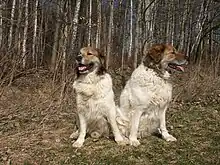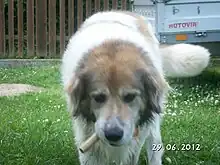| Czech Mountain Dog | |||||||||
|---|---|---|---|---|---|---|---|---|---|
 Male and female Czech Mountain Dog | |||||||||
| Other names | Český horský pes Bohemian Mountain Dog | ||||||||
| Origin | Czech Republic | ||||||||
| |||||||||
| |||||||||
| Dog (domestic dog) | |||||||||
Czech Mountain Dog (Czech: Český horský pes) is a breed originating from the Czech Republic, which began to be bred in the 70s of the 20th century. As the basis of this breed, Slovak mutts and crossbreeds of several breeds brought from Canada, which were bred for maximum performance in sledding and other breeds, were used.[1]
History
Czech mountain dog was created in the former Czechoslovakia by crossing the Slovak Cuvac and the Canadian sled dog.[2] Crossbreeding and breeding began in the 1970s. It was recognized as a Czech national breed in 1984. The main intention of the crossing was a dog suitable for local mountain conditions but also a dog suitable for mushing. The first litter of puppies was born on 12 August 1977 in the kennel Třeboň – Kopeček.[3][4] Seven puppies were born. This breed experienced its biggest "boom" in the 1990s, when they were in high demand. Today it is a popular but almost unknown breed even for the Czech public. Today it is used as a pet and as an avalanche dog.
They are covered by one breeding club, the Czech Mountain Dog Club. The official abbreviation used is CHP.
Appearance

Czech Mountain Dog measures 60 to 70 cm at the withers, 56 to 66 cm for the female. They weigh about 30 to 40 kg and the female 26 to 36 kg.
It has a black nose and medium-sized, oval, brown eyes that give him a mild and pleasant expression. It has strong lips, under which hide large teeth with a regular scissor or pincer bite. Large, triangular and overhanging ears are set high and far apart. The neck is of medium length, strong, muscular and without a lobe.
The body shape is slightly rectangular. The chest reaches the elbows and is long and oval. The abdomen is slightly retracted. His richly furry tail is exactly in the line of his back. When the dog is at rest, the tail is pointing down. When the dog is happy or excited, it carries it over its back and looks like a sickle. The back is straight and firm. It moves on straight, long and strong legs with large oval paws.
The Czech Mountain Dog has about 10 cm long, dense, straight, harder, mottled white fur with brown or black spots. The fur is shorter on the head and on the front sides of the legs, and in winter it grows with a rich undercoat. The head is colored all over or has a white patch. The spots on the body are irregularly distributed.
Temperament
A versatile sports and working dog, intended for the mountains. He is pleasant, friendly, confident and lively. He is not aggressive. It is relatively easy to train. He likes both children and other animals and dogs. It is suitable for use as a rescuer, shepherd, guard, etc. It is not very dominant. He is playful and active. He behaves aloof towards strangers, but after a while he likes them. It is also a good watchdog and can react aggressively to any unwelcome guest in order to defend the family.
Czech Mountain Dog lives for around 11-12 years.
Care
It does not require any special care, but it is demanding on education and movement. He is a lively and energetic dog, so he needs somewhere to discharge his energy and liveliness. Therefore, it is more suitable for a house with a garden, where it will have a large paddock. Most of all, he likes work and long walks in nature.
It requires training and upbringing, these must be clear and must be learned from a puppy. He must be guided with a firm hand. He does not like rough treatment, physical punishments are not suitable.
See also
References
- ↑ "Český horský pes Psi Plemeno / Druh". iFauna (in Czech). Retrieved 21 September 2023.
- ↑ "Český horský pes". rozhlas.cz (in Czech). 4 August 2009. Retrieved 21 September 2023.
- ↑ "Český horský pes". ceskyhorskypes.cz. Retrieved 21 September 2023.
- ↑ Kučerová, Sabina (23 November 2016). "Český horský pes je nejmladší české plemeno. Jeho praotec je z Kanady". iDNES.cz (in Czech). Retrieved 21 September 2023.